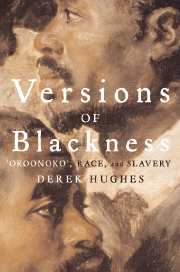Book contents
- Frontmatter
- Contents
- Introduction
- A Note on the Texts
- Chronology
- PART ONE THE MAJOR TEXTS
- PART TWO CONTEXTS: EUROPE, AMERICA, AND AFRICA
- A Short Account of the Destruction of the Indies
- Democrates Secundus
- “Of the Cannibals” and “Of Coaches”
- On Spreading the Gospel Among the Savages
- The English-American his Travail by Sea and Land
- A True and Exact History of the Island of Barbados
- The History of Sir Francis Drake
- Voyage de la France Equinoxiale en l'Isle de Cayenne
- An Exact Relation of the Most Execrable Attempts of John Allin
- The History of the Caribby-Islands
- Histoire Generale des Antilles Habitées par les François
- An Impartial Description of Surinam
- Great Newes from the Barbadoes
- The Negro's and Indians Advocate
- Friendly Advice to the Gentlemen Planters of the East and West Indies
- DISCUSSIONS OF COLONIALISM
- Bibliography
- Index
“Of the Cannibals” and “Of Coaches”
Published online by Cambridge University Press: 05 June 2012
- Frontmatter
- Contents
- Introduction
- A Note on the Texts
- Chronology
- PART ONE THE MAJOR TEXTS
- PART TWO CONTEXTS: EUROPE, AMERICA, AND AFRICA
- A Short Account of the Destruction of the Indies
- Democrates Secundus
- “Of the Cannibals” and “Of Coaches”
- On Spreading the Gospel Among the Savages
- The English-American his Travail by Sea and Land
- A True and Exact History of the Island of Barbados
- The History of Sir Francis Drake
- Voyage de la France Equinoxiale en l'Isle de Cayenne
- An Exact Relation of the Most Execrable Attempts of John Allin
- The History of the Caribby-Islands
- Histoire Generale des Antilles Habitées par les François
- An Impartial Description of Surinam
- Great Newes from the Barbadoes
- The Negro's and Indians Advocate
- Friendly Advice to the Gentlemen Planters of the East and West Indies
- DISCUSSIONS OF COLONIALISM
- Bibliography
- Index
Summary
Michel eyquem de montaigne (1533–92), the famous French essayist, was particularly influential in reviving the ancient philosophy of Pyrrhonism, which held that verifiable knowledge was impossible. Challenging the idea that Christianity was capable of rational demonstration, he argued that human reason was inevitably fallible. In his longest essay, “The Apologie of Raimond Sebond” (Book II, Essay xii), he argued that sensory information could not be verified and that customs varied so profoundly from culture to culture that it was impossible to assert the existence of universal moral values. Montaigne had a profound influence on the development of free thought: Oroonoko's French tutor is his intellectual heir. His cultural relativism and religious open-mindedness are evident in the way he compares European and American cultures, to the disadvantage of the former.
Influences on Montaigne include Las Casas and the French Huguenot writer Jean de Léry (1534–1613?), who had not only lived among Brazilian cannibals but also had experienced the horror of the French Wars of Religion (1562–98). The most famous atrocity committed in these wars was the Massacre of Saint Bartholomew in August 1572, but the catalogue of violence also included cannibalism, done both because of starvation (among Huguenots in the siege of Sancerre) and religious hatred: Some members of the St Bartholomew mob devoured the hearts and livers of their slain adversaries.
- Type
- Chapter
- Information
- Versions of BlacknessKey Texts on Slavery from the Seventeenth Century, pp. 287 - 292Publisher: Cambridge University PressPrint publication year: 2007

